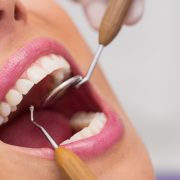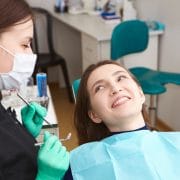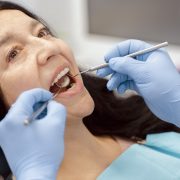Why Alcohol is Bad For Teeth
Alcohol is legal for of-age adults, but just because you can imbibe, doesn’t mean you should. Alcohol must be drunk responsibly and in moderation in order to avoid associated hazards. One of the least discussed risks associated with drinking alcohol doesn’t involve endangering others, but oneself. Alcohol is one of the worst things you can drink in terms of oral health, your dentist in dentist in Medina, OH wants you to know. Rather than contributing vital vitamins and minerals, it has huge negative effects on oral health in more ways than one. Understanding these risks can help you to make informed decisions about alcohol and your dental health.
Enamel Erosion
Many alcoholic beverages, especially wine, beer and mixed drinks, are highly acidic. This acid gradually wears away the protective enamel on teeth, making them more susceptible to decay and sensitivity. Once enamel is eroded, it can’t regenerate, and this increases the risk of cavities, not to mention permanent staining of teeth.
Dry Mouth and Reduced Saliva Production
Even though you’re drinking a liquid, alcohol has a drying effect on the mouth (and body), reducing saliva production. Saliva is essential for neutralizing acids, washing away food particles, and preventing bacterial growth. A dry mouth creates an ideal environment for harmful bacteria to thrive, leading to bad breath, cavities and gum disease.
High Sugar Content in Alcoholic Drinks
Alcohol often contains high amounts of sugar, which fuels bacteria that produce acid and attack tooth enamel. Even lower-sugar options like wine and beer can still contribute to bacterial growth and plaque buildup, increasing the likelihood of cavities and gum inflammation.
Gum Disease Risk
Heavy alcohol consumption is linked to a higher risk of periodontal disease in Medina, OH. Alcohol can irritate the gums, weaken the immune response, and make it harder for the body to fight infections. Over time, untreated gum disease can lead to gum recession, tooth loss and even systemic health issues.
Increased Risk of Oral Cancer
Excessive alcohol consumption is a known risk factor for oral cancer. Alcohol irritates the soft tissues of the mouth and can increase the harmful effects of tobacco use, significantly raising the chances of developing cancer in the lips, tongue, and throat.
No one is saying you should stop drinking. But knowing the risks to your oral health is good for everyone. Contact us today to learn more.










